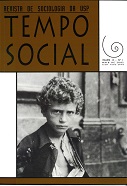Gerações, modernidade e subjetividade coletiva
DOI:
https://doi.org/10.1590/S0103-20702002000100004Palavras-chave:
modernidade, subjetividade, geraçõesResumo
As gerações como problema sociológico, conceitual e empiri-camente, têm recebido certa atenção recentemente. Todavia permanecem subteorizadas, de modo geral e em termos de suas configurações particulares na modernidade. Este artigo revê a literatura sociológica e antropológica sobre o tema e propõe-se a reconceituá-lo fazendo uso do conceito de "subjetividade coletiva", para então retomar a sua análise nos quadros da sociedade moderna.
Downloads
Referências
ADAM, Barbara. (1990) Time and social theory. Cambridge, Polity.
BEALL, Cynthia M. (1984) Theoretical dimensions of a focus on age in physical anthropology. In: KERTZER, David I. & KEITH, Jennie (orgs.). Age and anthropological theory. Londres e Ithaca, NY, Cornell University Press.
CASTELLS, Manuel. (1998) End of millennium. Oxford, Blackwell.
COHEN, Ronald. (1984) Age and culture as theory. In: KERTZER, David I. & KEITH, Jennie (orgs.). Age and anthropological theory. Londres e Ithaca, NY, Cornell University Press.
CORSTEN, Michael. (1999) The time of generations. Time & Society, 8.
DEBERT, Guita Grin. (1999) A reinvenção da velhice: socialização e processos de reprivatização do envelhecimento. São Paulo, Edusp.
DOLHINOW, Phyllis. (1984) The primates: age, behavior, and evolution. In: KERTZER, David I. & KEITH, Jennie (orgs.). Age and anthropological theory. Londres e Ithaca, NY, Cornell University Press.
DOMINGUES, José Maurício. (1995) Sociological theory and collective subjectivity. Londres, Macmillan.
DOMINGUES, José Maurício. (1996) Sistemas sociais e subjetividade coletiva. Dados, Rio de Janeiro, 36.
DOMINGUES, José Maurício. (1999a) Criatividade social, subjetividade coletiva e a modernidade brasileira contemporânea. Rio de Janeiro, Contracapa.
DOMINGUES, José Maurício. (1999b) Sociologia e modernidade. Para entender a sociedade contemporânea. Rio de Janeiro, Civilização Brasileira.
EISENSTADT, Schmuel. (1956) From generation to generation. New York, Free Press.
FEATHERSTONE, Mike & WERNICK, Andrew (orgs.). (1995) Images of aging. Cultural representations of later life. Londres, Routledge.
FONER, Nancy. (1984) Age and social change. In: KERTZER, David I. & KEITH, Jennie (orgs.). Age and anthropological theory. Londres e Ithaca, NY, Cornell University Press.
FORTES, Meyer. (1984) Age, generation, and social structure. In: KERTZER, David I. & KEITH, Jennie (orgs.). Age and anthropological theory. Londres e Ithaca, NY, Cornell University Press.
GADAMER, Hans-Georg. (1960) Wahrheit und methode. Tübingen, J.C. B. Mohr.
GRUPPO, Luis Antonio. (2000) A juventude. São Paulo, Difel.
HALPERIN, Rhoda. (1984) Age in cultural economics: an evolutionary approach. In: KERTZER, David I. & KEITH, Jennie (orgs.). Age and anthropological theory. Londres e Ithaca, NY, Cornell University Press.
HAREVEN, Tamara. (1986) Historical changes in the social construction of the life course. Human Development, 29.
HAREVEN, Tamara. (1995) Changing images of aging and the social construction of the life course. In: FEATHERSTONE, Mike & WERNICK, Andrew (orgs.). Images of aging. Cultural representations of later life. Londres, Routledge.
HELD, Thomas. (1986) Institutionalization and deinstitutionalization of the life course. Human Development, 29.
KETTLER, David; MEJA, Volker & STEHR, Nico. (1990) Rationalizing the irrational: Karl Mannheim and the besetting sin of German intellectuals. American Journal of Sociology, 95.
KERTZER, David I. (1982) Generation and age in cross-cultural perspective. In: RILEY, Matilda W.; ABELES, Ronald & TEITELBAUM, Michael (orgs.). Aging from birth to death: sociotemporal perspectives. Boulder, Westview Press.
KERTZER, David I. & KEITH, Jennie. (1984) Introduction. In: (orgs.). Age and anthropological theory. Londres e Ithaca, NY, Cornell University Press.
KOHLI, Martin & MEYER, John W. (1986) Social structure and social construction of life stages. Human Development, 29.
MABURY-LEWIS, David. (1984) Age and kinship: a structural view. In: KERTZER, David I. & KEITH, Jennie (orgs.). Age and anthropological theory. Londres e Ithaca, NY, Cornell University Press.
MANNHEIM, Karl. (1928) Das problem der generationen.In: Wissenssoziologie. Berlim, Neuwied, Herman Luchterhand.
MELUCCI, Alberto. (1996) Challenging codes. Cambridge, Cambridge University Press.
MERTON, Robert K. (1968) Social theory and social structure. New York, Free Press.
MINAYO, Maria Cecília de Souza et alii. (1999) Fala galera. Rio de Janeiro, Garamond.
MYERHOFF, Barbara. (1984) Ritual and signs of ripening: the intertwining of ritual, time, and growing old. In: KERTZER, David I. & KEITH, Jennie (orgs.). Age and anthropological theory. Londres e Ithaca, NY, Cornell University Press.
ÖSTOR, Ákos. (1984) Chronology, category, and ritual In: KERTZER, David I. & KEITH, Jennie (orgs.). Age and anthropological theory. Londres e Ithaca, NY, Cornell University Press.
PARSONS, Talcott & PLATT, Gerald M. (1973). The American university. Cambridge, MA, Harvard University Press.
RILEY, Matilda W. (1986) The dynamisms of life stage: roles, people, and age. Human Development, 29.
RYDER, Norman B. (1965) The cohort in the study of social change. American Sociological Review, 30.
ROSANVALLON, Pierre. (1995) La nouvelle question sociale. Paris, Seuil.
SCHUMAN, Howard & SCOTT, Jaqueline. (1989) Generations and collective Memory. American Sociological Review, 54.
TURNER, Bryan. (1995) Aging and identity: some reflections on the somatization of the self. In: FEATHERSTONE, Mike & WERNICK, Andrew (orgs.). Images of aging. Cultural representations of later life. Londres, Routledge.
TURNER, Bryan. & EYERMAN, Ron. (1998) Outline of a theory of generations. European Journal of Social Theory, 1.
VIANNA, Hermano (org.). (1997) Galeras cariocas. Territórios de conflitos e encontros culturais. Rio de Janeiro, Editora UFRJ.
ZALUAR, Alba. (1994) O condomínio do diabo. Rio de Janeiro, Revan/Editora UFRJ.
Downloads
Publicado
Edição
Seção
Licença
Copyright (c) 2015 Tempo Social

Este trabalho está licenciado sob uma licença Creative Commons Attribution-NonCommercial 4.0 International License.



